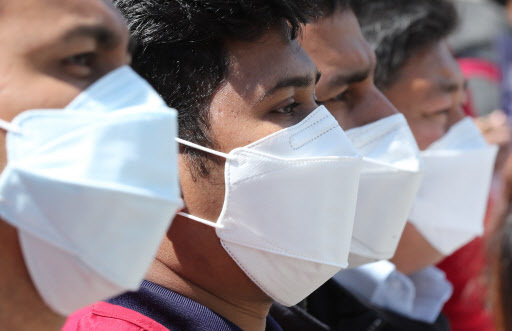Extend work permits for stranded migrants, advocates say
By Ock Hyun-juPublished : Feb. 13, 2021 - 16:00

A rise in the number of unregistered migrants who are stranded in South Korea, unable to return home amid the coronavirus pandemic, is prompting calls to allow them to live and work legally in the country.
With international flights curtailed due to the pandemic, the government has granted extensions of stay for migrant workers whose visas have expired. But they are not allowed to work here during the extended stay.
“We urge the government to extend work permits for migrant workers whose visas had expired,” Udaya Rai, head of the Migrants Trade Union, told The Korea Herald.
“Migrant workers whose visas expired cannot go back home even though they want. Some people return home on chartered flights, while others are stuck here because flight tickets are too expensive,” he said.
“While they are here, however, they cannot work and earn income here so some of them are turning to illegal work,” Rai said, adding that finding work illegally is also challenging as employers are reluctant to hire those staying here only temporarily.
An association of 17 migrants’ rights groups, including the Women Migrants Human Rights Center of Korea and WeFriends, put out a statement last week urging the government to bring unregistered migrants into a legal framework.
“With international flights suspended due to the COVID-19 pandemic, there is a growing number of cases in which foreigners here could not leave the country after the end of their sojourns and ended up becoming illegal aliens,” the organizations said.
“It is already beyond the controllable level so they should be brought into a legal boundary,” they said.
The number of foreign nationals in Korea stood at 2 million as of the end of November, down 15.4 percent from a year earlier. About 392,575 people were staying here illegally as of the end of November, up 0.5 percent from the previous year.
The statement added that a number of small and medium-sized firms in the country’s manufacturing, agricultural and fishing sectors were suffering from labor shortages.
Last year, Korea was set to accept 56,000 foreigners under the Employment Permit System, under which the country accepts workers from 16 Asian countries to fill low-skilled jobs. But only 9.9 percent of them had made it to Korea as of August, according to data from the Ministry of Employment and Labor.
Due to tougher entry restrictions amid the pandemic, arrivals of new foreign workers under the EPS have been limited. Those seeking to enter the country under the EPS must present negative coronavirus test results. They also have to self-quarantine for two weeks, which costs employers about 1.4 million won ($1,250).
This year the government is set to accept 52,000 foreigners under the EPS, but it is not clear when they will be able to enter the country.
Lawmakers have put forward revisions to allow foreign workers stuck in the country to work during their extended stay amid the pandemic.
Rep. Baek Hye-ryun of the ruling Democratic Party of Korea presented a revision that would allow the one-year extension of an EPS work permit if an employee were unable to return home and if the employer agreed.
“With reduced international flights, foreign workers cannot leave Korea and reentry of foreign workers is also uncertain, which takes a toll on businesses hiring foreign workers,” she said.
She added that the bill was intended to help prevent foreign workers from turning to illicit work and businesses from being shut down because of the lack of laborers.
Reps. Lim Li-ja and Hong Seok-joon of the People Power Party also submitted revisions that would allow the extension of expired work permits by up to a year for foreign workers in certain situations. One bill deals with natural disasters and the other with the spread of infectious disease.
By Ock Hyun-ju (laeticia.ock@heraldcorp.com)
-
Articles by Ock Hyun-ju







![[Graphic News] More Koreans say they plan long-distance trips this year](http://res.heraldm.com/phpwas/restmb_idxmake.php?idx=644&simg=/content/image/2024/04/17/20240417050828_0.gif&u=)
![[KH Explains] Hyundai's full hybrid edge to pay off amid slow transition to pure EVs](http://res.heraldm.com/phpwas/restmb_idxmake.php?idx=644&simg=/content/image/2024/04/18/20240418050645_0.jpg&u=20240419100350)






![[From the Scene] Monks, Buddhists hail return of remains of Buddhas](http://res.heraldm.com/phpwas/restmb_idxmake.php?idx=652&simg=/content/image/2024/04/19/20240419050617_0.jpg&u=20240419175937)

![[KH Explains] Hyundai's full hybrid edge to pay off amid slow transition to pure EVs](http://res.heraldm.com/phpwas/restmb_idxmake.php?idx=652&simg=/content/image/2024/04/18/20240418050645_0.jpg&u=20240419100350)

![[Today’s K-pop] Illit drops debut single remix](http://res.heraldm.com/phpwas/restmb_idxmake.php?idx=642&simg=/content/image/2024/04/19/20240419050612_0.jpg&u=)